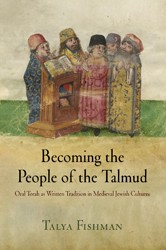At once a study of biblical theology and modern Jewish thought, this volume describes a “participatory theory of revelation” as it addresses the ways biblical authors and contemporary theologians alike understand the process of revelation and hence the authority of the law. Benjamin Sommer maintains that the Pentateuch’s authors intend not only to convey God’s will but to express Israel’s interpretation of and response to that divine will. Thus Sommer’s close readings of biblical texts bolster liberal theologies of modern Judaism, especially those of Abraham Joshua Heschel and Franz Rosenzweig. This bold view of revelation puts a premium on human agency and attests to the grandeur of a God who accomplishes a providential task through the free will of the human subjects under divine authority. Yet, even though the Pentateuch’s authors hold diverse views of revelation, all of them regard the binding authority of the law as sacrosanct. Sommer’s book demonstrates why a law-observant religious Jew can be open to discoveries about the Bible that seem nontraditional or even antireligious.

Nonfiction
Revelation and Authority: Sinai in Jewish Scripture and Tradition
- From the Publisher
December 22, 2015
Discussion Questions

Jewish literature inspires, enriches, and educates the community.
Help support the Jewish Book Council.



